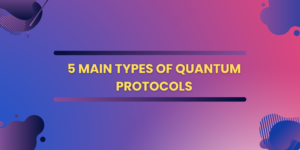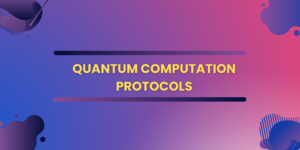Types of Quantum Protocols, In the ever-evolving landscape of quantum information processing, various quantum protocols have emerged, each designed to tackle specific challenges and harness the unique properties of quantum systems. These protocols span diverse applications, from quantum communication to quantum cryptography and quantum computation

Types of Quantum Protocols are explained as follows:
1. Quantum Communication Protocols
- Quantum Key Distribution (QKD): QKD protocols enable secure communication by leveraging the principles of quantum mechanics to share cryptographic keys. Notable protocols include BBM92 (named after its inventors Bennett, Brassard, Mermin, and others) and E91.
- Quantum Teleportation: Quantum teleportation protocols allow the transfer of quantum information from one location to another without the physical transfer of particles. This is achieved through the entanglement of quantum states.
- Quantum Repeaters: Quantum repeater protocols aim to extend the range of quantum communication by mitigating the impact of quantum signal loss over long distances. These protocols involve entanglement swapping and purification processes.
2. Quantum Cryptography Protocols
- Quantum Coin Flipping: Quantum coin-flipping protocols involve two parties attempting to agree on the outcome of a coin flip over a quantum channel. Quantum principles ensure fairness and security in the process.
- Quantum Oblivious Transfer: Quantum oblivious transfer protocols enable a sender to transfer one of two messages to a receiver, with the sender remaining oblivious to the receiver’s choice. Quantum superposition and entanglement play crucial roles.
- Quantum Secret Sharing: Quantum secret-sharing protocols allow the secure sharing of a secret among multiple parties. Quantum entanglement ensures that the secret can only be reconstructed when a sufficient number of parties collaborate.
3. Quantum Computation Protocols

1. Quantum Error Correction:
Quantum error correction protocols address the inherent fragility of quantum information due to decoherence and errors. Notable codes include the Shor code and the surface code, which use redundant encoding to protect quantum states.
2. Quantum Search Algorithms:
Quantum search protocols, like Grover’s algorithm, provide exponential speedup in searching an unsorted database compared to classical algorithms. These algorithms leverage quantum parallelism and amplitude amplification.
3. Quantum Fourier Transform:
Types of Quantum Protocols like Quantum Fourier transform protocols form a foundational element in many quantum algorithms, including Shor’s factoring algorithm. They efficiently transform quantum states in the computational basis to their Fourier basis.
4. Quantum Metrology Protocols
- Quantum Phase Estimation: Quantum phase estimation protocols leverage quantum interference to estimate the phase of a unitary operator with high precision. They find applications in quantum metrology and quantum algorithms.
- Quantum Sensing Protocols: Quantum sensing protocols exploit quantum coherence and entanglement to achieve enhanced precision in measurements. Applications include magnetic field sensing and gravitational wave detection.

5. Quantum Machine Learning Protocols
- Quantum Neural Networks: Types of Quantum Protocols like Quantum neural network protocols harness the principles of quantum computation to enhance machine learning tasks. Quantum entanglement and superposition contribute to the potential speedup in certain computations.
- Quantum Support Vector Machines: Quantum support vector machine protocols aim to enhance classification tasks by leveraging quantum parallelism to explore multiple solutions simultaneously.
Conclusion
The Diverse Types of Quantum Protocols showcase the versatility of quantum information processing across communication, cryptography, computation, metrology, and machine learning
Frequently Asked Questions (FAQs)
What is Quantum Key Distribution (QKD)?
Ans- Quantum Key Distribution (QKD) is a quantum communication protocol that enables the secure sharing of cryptographic keys between two parties using the principles of quantum mechanics. It ensures the security of communication channels by detecting any eavesdropping attempts.
What is Quantum Teleportation?
Ans- Quantum teleportation is a quantum communication protocol that allows the transfer of quantum information from one location to another without the physical transfer of particles.
What are Quantum Repeaters?
Ans- Quantum repeaters are protocols designed to extend the range of quantum communication by mitigating the impact of quantum signal loss over long distances. These protocols involve entanglement swapping and purification processes.
What is Quantum Coin Flipping?
Ans- Quantum coin flipping is a quantum cryptography protocol where two parties attempt to agree on the outcome of a coin flip over a quantum channel.
What is Grover’s Algorithm?
Ans- Grover’s algorithm is a quantum search algorithm that provides exponential speedup in searching an unsorted database compared to classical algorithms.
also learn 4 main Quantum Key Distribution Protocols
From the internet [click here]

4 thoughts on “5 main Types of Quantum Protocols: Unveiling the Diversity”